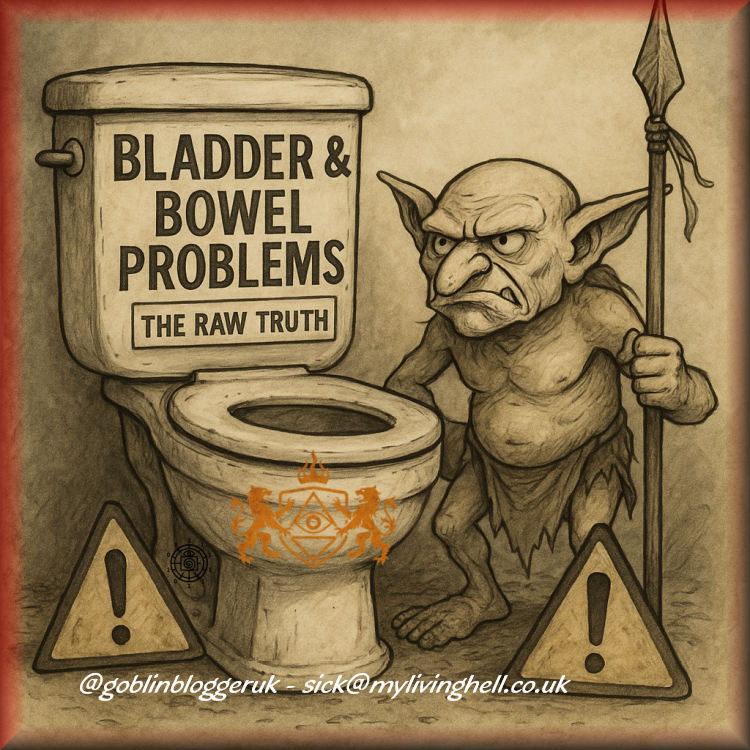- Posted on
⚠️ Please read with care: This blog shares personal, sometimes painful experiences. My intention is to support and speak honestly not to harm. I’m not a professional, just someone who understands how hard it can get. If you're struggling, you're not alone please reach out for professional help.
MS doesn’t just make you trip over your own feet and forget why you went into the kitchen. It messes with the plumbing. Nerves that should quietly manage bladder and bowel signals suddenly turn into pranksters and the result is humiliation, pain, infection, and a daily game of “will I, won’t I?”
The Bladder Circus
What can happen:
Urgency: You go from “fine” to “I’m going to piss myself in 10 seconds” with no warning.
Frequency: You feel like you’ve been drinking beer all day, even if you haven’t.
Retention: The bladder doesn’t empty properly → infection factory.
Incontinence: The ultimate betrayal — leaks at random times.
Why: Nerves between brain, spine, and bladder are scrambled. It’s not “just drink less tea.” It’s wiring gone wrong.
The treatments (aka the patchwork quilt):
Catheters: From discreet intermittent sticks to full-time plumbing. Nobody tells you it can actually be liberating (less panic, more freedom).
Meds: Anticholinergics, beta-3 agonists — they can help, but often come with dry mouth, constipation, or zombie brain.
Botox: Not just for faces. Injected into the bladder wall, it calms spasms. Bonus: you get to tell people your bladder is fancier than their foreheads.
Lifestyle tweaks: Avoiding caffeine, alcohol, fizzy drinks, timed peeing. (Translation: giving up joy, but sometimes it helps.)
The Bowel Hellscape
What can happen:
Constipation: Weeks of nothing, pain, bloating, then the evacuation from hell.
Diarrhoea: The opposite. You live within sprinting distance of a toilet.
Incontinence: Accidents. Stains. Shame. The stuff people never talk about but everyone fears.
Why: Same reason as bladder — nerve signals scrambled. Plus fatigue means less movement, meds slow gut, diet gets wrecked.
The treatments:
Laxatives: Everything from gentle stool softeners to chemical warfare. Often trial and error.
Suppositories & enemas: The glamorous life.
Bowel training: Timed routines, diet tweaks, abdominal massage. Sometimes works, sometimes a joke.
Pelvic floor physio: Can help with both holding in and pushing out. But access on the NHS can be patchy.
Colostomy: The nuclear option. For some it’s actually a relief — predictable, controllable, no more humiliating accidents.
The Real Raw Truth
Nobody talks about it. Bladder and bowel problems are treated as shameful, so patients suffer in silence. But they’re some of the most disabling symptoms in MS.
Doctors often gloss over it. Unless you bring it up (awkwardly), it gets ignored. Yet infections from retention can cause relapses, hospital stays, even sepsis.
Impact is brutal. You can lose social life, intimacy, confidence, freedom. Fear of accidents dictates everything.
Cures don’t exist. Management does. Which means a constant balancing act between side effects, dignity, and practicality.
Humour helps. Laugh at it or drown in shame. Everyone’s got a story about public toilets, accidents, or catheters gone wrong. Talking about it takes the power back.
Dark Sarcasm Corner
Nurse: “Any bladder or bowel issues?” Me: “Only that they’ve staged a coup and I’m the hostage.” MS: “You wanted unpredictable symptoms? Hold my beer — oh wait, you can’t drink that anymore.”
Conclusion
Bladder and bowel problems with MS are not side notes — they’re daily battles. There’s no miracle cure, just messy workarounds. But if more of us talk about it openly, it kills the shame. These are not “bathroom problems.” They’re MS problems.
You’re not weak. You’re not dirty. You’re a human with broken wiring, trying to survive with dignity intact. And if that means Botox in your bladder or a colostomy bag named Bob, so be it.
I write in ink and fury, in breath and broken bone.
Through storm and silence, I survive. That is the crime and the miracle.
𐑢𐑨𐑑𐑒𐑣𐑧𐑮 𐑨𐑥𐑴𐑙 𐑢𐑨𐑑𐑒𐑣𐑧𐑮𐑕
